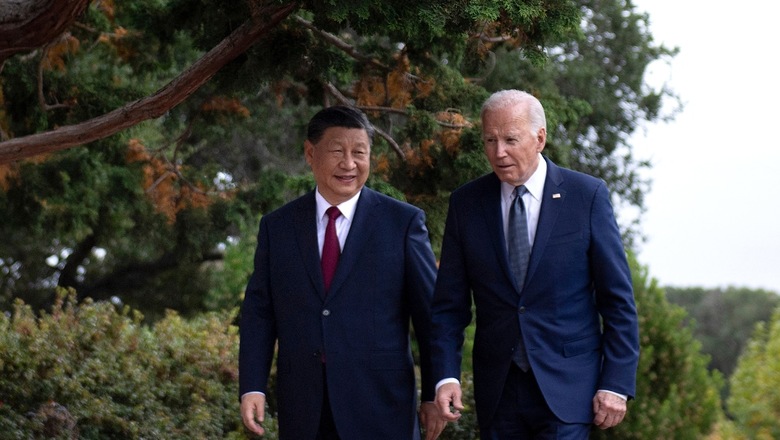
views
The Joe Biden-Xi Jinping meeting in San Francisco on the occasion of the APEC summit did not signify any meaningful breakthrough in their increasingly adversarial relationship. To alter the dynamics behind the deterioration of their ties, a redefinition of their interests and policies is needed. This is not on the cards.
The US sees China as a rival, the only real one that can counter US global power, politically, economically and technologically. If the Chinese political and economic system was compatible with that of the West and China was seen as willing to become a part of the West-dominated global system without challenging it as it became more powerful itself, its rise would not have been considered threatening the way it is today. In fact, this was the US expectation when China was admitted to the WTO, the West made massive investments in China and gave access to its advanced technology.
The public and political mood in the US has become antagonistic towards China. The Biden government has taken steps to deny advanced technologies to China, including advanced semiconductors, put restrictions on Chinese investments in sensitive sectors, monitor more closely academic interactions between the two countries, promote on-shore manufacturing, develop trustworthy and resilient supply chains to reduce dependence on China, compete with China in connectivity projects to give more options to developing countries, pay more attention to Africa, promote the Indo-Pacific concept, the Quad as well as AUKUS to deter China, and so on.
China’s determination to build its comprehensive national power, rapidly enhance its military capacities, discard the concept of its peaceful rise, declare openly its time-lined ambitions to be at the centre of global governance by 2049, and discuss openly the dangers of China and the US getting locked into a Thucydides Trap, explains its ties with the US moving from partnership to rivalry.
The tone and substance of the Blinken-Yang Jiechi meeting in Alaska in 2021 showed a more confident and combative China. Since then, China’s Wolf Warrior diplomacy and the unsparing comments by Chinese spokespersons on US policies represent a change in equations between the two countries.
China makes no secret of its intention to end the US hegemony over global affairs. In the first instance, it seeks to counter America’s strong military presence in the western Pacific. Apart from developing naval, missile and nuclear capacities of its own, this includes reclaiming and militarising islands in the South China Sea. At the centre of this strategy are serious differences over the future of Taiwan. China considers Taiwan an integral part of China and expresses its clear intention to either achieve reunification peacefully or by force, if necessary.
China’s Belt and Road Initiative, its connectivity projects, the strategy of gaining control over critical raw materials and technologies, strengthening ties with Iran, brokering reconciliation between Saudi Arabia and Iran, entry into Middle East politics at the expense of the historic US influence in the region, increasing its presence in Africa, role in the SCO, the push for expansion of BRICS, are various ways in which it seeks to challenge what it sees is a declining US.
A key part of this evolving strategy is strengthening strategic ties with Russia, and together with it promoting a multipolar world.
At his meeting with Xi, Biden, according to the White House readout, registered the various US concerns about China and was unapologetic about the steps taken to redress the balance in America’s favour. He made it clear that the two countries were in competition but that the US would want to manage this competition responsibly in order to prevent conflict and avoid confrontation. This nuances the earlier enunciation of US policy towards China which laid out that the US will compete, cooperate, and where necessary, confront China.
Biden made it plain that the US will invest in sources of strength at home and align with allies and partners. Not that China is not aware of this, but the point in emphasising this was to draw limits to the engagement that the US seeks with China. With this in view, Biden reaffirmed support for a free and open Indo-Pacific, peace and stability in the South China Sea and the East China Sea, and freedom of navigation and overflight. He underlined America’s iron-clad commitment to defending its allies, which was a signal also to its allies that this US overture towards China would not be at the cost of its commitment to its allies. On the very sensitive issue of Taiwan, he warned against any unilateral change of status quo in Taiwan and called for Chinese restraint.
The US President also mentioned China’s unfair trade practices and non-market economic practices. He was clear on preventing advanced US technologies from being used to undermine America’s national security, though this would be without unduly limiting trade and investment, he said.
Biden also spoke of America’s international human rights commitments and its concerns about human rights in Xinjiang, Tibet and Hong Kong. At the Blinken-Yang Jiechi meeting in Alaska, the Chinese diplomat had hit back hard at the US on this point, but this time, in China’s readout of the meeting, this US critique was not directly rejected.
In his meeting with Biden and with the US CEOs, Xi chose to adopt a conciliatory, non-combative but quietly firm tone in response to the US’s more explicitly blunt positions. He made it clear that Taiwan was non-negotiable and that it would inevitably become part of China. He asked the US to stop arming Taiwan and support peaceful reunification. He also cautioned that military communication between the two countries would be on the basis of equality and mutual respect. He noted that US actions were stifling China’s development and that the US should not scheme to suppress or contain China. Both sides should understand each other’s bottom lines, he said and asked the US not to interfere in China’s internal affairs. In other words, the differences in the positions of the two countries were not eluded.
The US seems to have in mind the Cold War model of its engagement with the Soviet Union on military matters while making the resumption of high-level military-to-military cooperation with China virtually the central goal of the Biden-Xi summit. The US and the Soviet Union despite being adversaries wanted nonetheless to agree to some confidence-building measures, avoid the danger of a direct conflict, besides preventing an unbridled arms race. These were the guardrails that the US put in place with the Soviet Union, and a version of these the US wants to establish with China.
The US has succeeded in restoring the high-level military-to-military cooperation with China, which the latter cancelled in August 2022. This is the kind of guardrail the US wanted to avoid tensions escalating into an actual military conflict. The US-China Defence Policy Coordination talks, the Maritime Consultation Agreement meeting, and telephone communication between theatre commanders will be resumed. The aim is the management of conflict, not the elimination of conflict. Xi has warned though that military communication between the two countries would be on the basis of equality and mutual respect. This caveat suggests that China can walk away again if it sees US actions in the region as unacceptably provocative, such as the US continuing to arm Taiwan.
The fundamental question Xi asked in San Francisco was whether the US and China were rivals or partners. Xi knows the answer but still chose to ask it rhetorically. A top-level meeting as part of diplomatic management does not overcome fundamental differences. Biden and Xi have met before, but US-China relations have continued to deteriorate. Putin and Biden, for instance, met in Geneva in June 2021 but we see how any hope that ties would improve has been totally belied.
Xi said that If the US considered China as its biggest rival, the most significant geopolitical challenge and an ever-pressing threat, then wrong policies, wrong actions and wrong results would follow. Xi expressed China’s willingness to be a partner and a friend to the US. He spoke of win-win cooperation, meeting each other halfway and handling differences calmly. He denied any intention to challenge the US or unseat it. None of this will convince the Americans or materially change negative perceptions about China in the US. This will be taken by the American policymakers as a political “soft-sell”.
It is argued that with China’s economy becoming sluggish, the seriousness of the real estate crisis in the country, rising youth unemployment, and the realisation that China needs the world as much as the world needs China, Xi Jinping was compelled to adopt a conciliatory discourse and do an image-restoring exercise. The US corporate and financial sector is a powerful pro-China lobby in the US and sending a comforting message to it was important. However, the fundamentals of Chinese political, economic and military strategy can hardly change.
The Biden-Xi summit sends a signal to Russia too. Russia’s relations with the US are at an impasse, but China, while joining hands with Russia to counter US hegemony, is also seeking engagement with the US. In the China-Russia-US triangle, China is giving itself more flexible diplomatic options.
Kanwal Sibal is a former Indian Foreign Secretary. He was India’s Ambassador to Turkey, Egypt, France and Russia. Views expressed in the above piece are personal and solely that of the author. They do not necessarily reflect News18’s views.




















Comments
0 comment